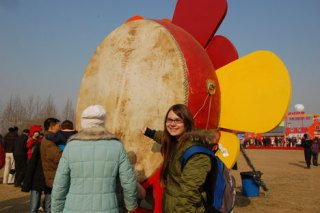Amanda Holtby of Langley has just come home from nearly a month studying abroad in China.
Holtby, a sophomore majoring in anthropology and studio art at Linfield College, is the daughter of Jennifer Sand and Jeff Holtby of Langley. She made the trip as part of the college’s January term, a four-week period of concentrated study in which students enroll in one course.
Students in her class, “Modern Transportation Systems in China,” checked out China’s modern transportation systems, including its planes, trains, taxis, the subway and personal automobiles. They also studied the construction and operation of the magnetic trains and learned about the engineering design of the railway in Tibet.
Holtby said her hosts in China and Tibet were gracious, and anxious to meet and mingle with Westerners.
“It was pretty fun, people would come up to us and ask to take picture with us like we were celebrities or something,” she said.
Talking about politics was taboo, though, in Tibet.
“One of the first things our tour guide said was, ‘Don’t ask me about politics.’”
Celebrating the Chinese New Year was an amazing experience, she said.
“It was the craziest thing I’d ever seen,” Holtby said, recalling how high-powered fireworks displays were lighted just about anywhere on the street, some lit by a cigarette. She got hit in the face with a piece of debris from one.
“They are pretty casual about it. They don’t seem to think they are very dangerous,” she said.
Transportation, the topic for the tour, was much different in China. The nation needs more roads and rails. Many people are clamoring for their own cars, and she recalled the solutions to traffic congestion in some areas; regular bans on driving and auctions for auto licenses. In Beijing, she said, rush hour is 11 hours each day.
Progress is being made, she noted.
“They’re making great leaps and bounds toward facing the challenges,” Holtby said.
While studying the transportation system, she endured two marathon train trips; the shorter, for 20 hours; the other, 25.
The two trips were only three days apart.
“We got a little stir crazy at times,” she said.
The second train trip was taken on the Lhasa Express to Tibet, billed as the highest train ride in the world. It nearly hits the 17,000-foot level.
“They have to pressurize the cabin,” Holtby said. “It was really cool, and you could ask for oxygen tubes if you wanted to.”
The tubes — a screw, hose and nose clip contraption on the wall — were for passengers made dizzy by the thin, high altitude air.
She said she and her fellow students tried them out.
“We all pretended we felt faint,” she laughed.



